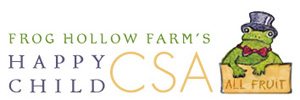In the face of what could seem like a big setback in our vegetable garden, we are finding promise of a new technique to mitigate pest pressure on our farm. Our glorious fava beans that were a sight to behold – tall, robust and flourishing, went under heavy attack by aphids. Aphids, suck the sap from leaves and stems and also act as a vector for disease and the growth of sooty mold. Our favas went from tall, green and glorious, to plants that were blackened and distorted, shortly before our big harvest of the pods. Luckily, the type of aphids that are attracted to favas do not like to feed on the other plants in the garden, so our winter greens and brassicas were left without damage.
While driving by the favas on the golf cart with Farmer Al he said “you can see why some farmers resort to using chemicals”. But at Frog Hollow, in our fledgling year of vegetable production, we are learning how we can use the favas year after year to maintain health and balance in our garden and potentially our orchard.
Favas do well in cooler weather and flower much earlier than many plants. They were blooming beautifully in December when not much else is in bloom on our farm. Our favas were covered in bees at this time since their blossoms were providing nourishment for our pollinator friends. Providing this winter food stuff encourages a healthy population of beneficial pollinators on our farm, which we are already working hard to maintain through our partnership with the Urban Bee Lab.
Because favas thrive in cooler weather they also attract pests earlier than other garden plants. Since the favas were acting as a host to so many aphids, they also provided the wonderful service of attracting beneficial predators of the pest – ladybugs and hover flies. The favas essentially act as a trap for these predators and have helped us establish a very healthy population of beneficials in our garden. The timing of all of this is actually beautiful. Since the favas life cycle is so much earlier than other garden plants, aphids that specifically like to feed on bean plants, come into the garden early. The predators come shortly after to have a feast on those aphids. As the predators are feasting on the favas aphids, the weather begins warming up and pests that attack our brassicas and other summer starts begin to emerge. But by now we already have a healthy population of beneficials in the garden to keep those pests in check.
Many organic farmers plant favas year after year in their fields for just this purpose, knowing they will never get a good bean harvest. This coming year in addition to planting favas in the garden, we may plant favas among some of the plum varieties that are most susceptible to aphid damage to draw in our beneficials early! We’ll keep you posted.

 Follow
Follow
